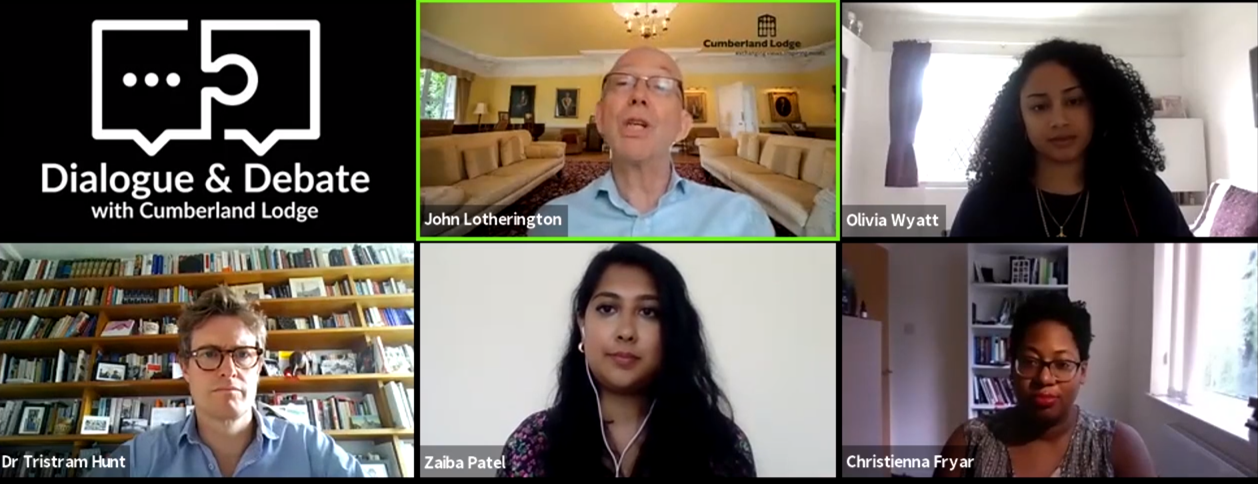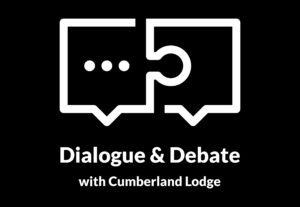On 9 July 2020, Cumberland Lodge hosted a Dialogue & Debate webinar as part of its four-part mini-series of webinars on the Black Lives Matter (BLM) movement, focusing on ‘Difficult Histories’. It was hosted by John Lotherington, Cumberland Lodge trustee and Director of the 21st Century Trust.
The discussion aimed to explore recent events associated with the BLM movement, in relation to key findings and recommendations from the 2019 Cumberland Lodge report Difficult Histories & Positive Identities.
Guest panellists involved in the discussion were:
- Dr Christienna Fryar, Lecturer in British Black History at Goldsmiths, University of London
- Dr Tristram Hunt, Director of the V&A Museum in London
- Zaiba Patel, History teacher at a secondary school in Oxford
- Olivia Wyatt, Researcher at the Young Historians Project
John opened up the webinar by referencing the findings of the Difficult Histories & Positive Identities report, which called for better co-ordination between different initiatives that aim to promote more accurate and representative accounts of British history. To achieve this, John invited each guest panellist to offer insight into how the BLM movement might be an agent for change, in addressing how British history is recited and interpreted.
BLM in the era of COVID-19
John invited Dr Christienna Fryar to offer her views on whether the BLM movement has provided the political energy necessary to drive change forward.
Christienna stated that, whilst the BLM movement is offering the political energy needed to bring about greater collaboration, it is at the same time coinciding with the national crisis surrounding the COVID-19 pandemic. Institutions that will be required to help facilitate change – including universities and museums – are physically and emotionally drained, dealing with the ramifications of the current crisis.
Christienna reflected that, while attention is firmly on reconciling the issues resulting from the public health emergency (e.g. social distancing measures, blended learning at universities etc), issues about race can easily be placed at ‘the bottom of the pile’. She stressed to the need to address this urgently, given that the disparities experienced by Black, Asian and minority ethnic communities are only getting wider as a result of the pandemic.
Diversity in the arts
John asked Dr Tristram Hunt about the changes he feels are needed in museums, in response to the BLM movement.
Tristram stated that, even though museums are currently in a financially precarious position, the pandemic should not distract them from tackling issues of race. He articulated that the arts should offer more diverse works, if they are to accurately reflect modern Britain and bring about a heightened sense of belonging and inclusion.
More specifically, Tristram stated that national museums, including the V&A in London, need to do more to make the curation process inclusive, by providing racial bias training and clamping down on microaggressions (i.e., compliments and/or jokes that contain hidden insults about marginalised groups). Tristram also acknowledged the V&A’s own colonial heritage, and said he believes it is important for ‘difficult histories’ to be examined in a careful and contemporary manner, to ensure an accurate and representative account of history.
Empowerment of students and teachers
Next, John asked Zaiba Patel to assess how the national curriculum can play a part in encouraging young people to discuss uncomfortable truths about British history.
Zaiba suggested that engaging young people in these difficult discussions can be achieved by having a more diverse curriculum that reflects global perspectives. This would enable teachers and students to feel more empowered to discuss a broader range of topics. Zaiba argued that giving students more of a voice allows them to engage openly with the information that is presented to them, rather than simply regurgitating it. By de-centralising power in the classroom in this way more opportunities for participation are created. This is something the BLM movement is calling for.
Zaiba talked about the importance of schools embracing this renewed sense of empowerment but noted extra Government funding is needed to achieve this.
More BAME historians and narratives
John then asked Olivia Wyatt to offer her views on whether the current wave of interest and passion for history will be sustained by the BLM movement.
Olivia reflected that history has always been a subject of interest and passion, but that what is taught is not necessarily interesting or meaningful for all students, especially for Black students, due to the lack of representation in the topics being explored.
Olivia said she welcomes the discourse around certain histories being added into the curriculum (e.g. histories of colonialism, migration and Empire), but emphasised that little notice is being paid to the writers of those histories. With the vast majority of historical literature in the UK being written by white academics, there is a real lack of representation for Black, Asian and minority ethnic voices.
Olivia argued that it is vital for organisations, such as the Young Historians Project, to draw attention to this problem, whilst also working to develop and nurture Black, Asian and minority ethnic talent to enter the academic workforce, to help diversify the literature and historical accounts available. She suggested that having a more representative and inclusive curriculum would help to sustain the current wave of enthusiasm being felt towards history as a subject, thanks to the BLM movement.
British history in public spaces
The second part of the ‘Black Lives Matter: Difficult Histories’ webinar opened up a discussion about whether citizen assemblies should be set up in communities, to help decide how history should be represented in public spaces.
Zaibareflected thatlocal history is incredibly important, and people should know all about their surroundings, including uncomfortable topics that can open up dialogue, and to promote a sense of belonging for everyone living in a certain area.
Tristram agreed with the citizen assembly idea and articulated that local engagement is critical in bringing communities together. He felt that, in order for these assemblies to be successful, public debate would need to become more balanced, with an appreciation of the need for ‘give and take’ on all sides.
A question from the audience referred to recent high-profile cases of statues being toppled, or their place in public spaces being called into question. All the guest panellists agreed that the statue of Edward Colston, who was involved in the Atlantic Slave Trade, should have been removed from the Bristol docks sooner, but ideally by democratic means. Christienna offered the perspective that Black voices calling for the removal of the statue had been ignored for years. This had fed into the discontent being experienced, and had helped to validate feelings that Black views and opinions were not being respected or listened to. This is another key message that the BLM movement has been drawing attention to.
British history in the classroom
Moving on to what sort of historical topics should be taught in schools, on the panellists discussed whether past histories – such as slavery – should be linked more to contemporary histories, like racism.
Christienna eloquently stated that “the legacies of slavery and emancipation remain in society today” and, with this in mind, it is important to realise that failing to address past contexts can lead to a lack of understanding in the present.
Olivia highlighted the fact that British colonialism is not something in our distant past; it was very much alive during the 20th century, and continues to have important ramifications for people’s lives today. She argued that histories should not be confined to the work of academics; there is also a place for the voices of activists, non-academic historians and oral histories, in helping to diversify the curriculum.
Christienna suggested that the British Empire history currently being taught in schools at Key Stage 3 is fairly celebratory, and that this does a disservice, as history should recount what Britain was a part of, including the good and the bad. She stated that all histories are ‘difficult’ and challenging, but that understanding the past, and how it effects the present, will be a vital ingredient in shaping British identity and values more positively.
The BLM movement and the future
In the final part of the discussion,a question was asked about the future of the BLM movement and what is needed to keep its momentum alive. Olivia suggested that one way is for people to support independent organisations that are working to promote changes in the curriculum. Tristram said institutional changes would be fundamental for improvements to take hold and stated that the V&A’s own anti-racism project has a five-year plan to build on the BLM momentum. Zaiba believes that enacting real change requires voices to be heard and diverse lived experiences to be validated.
The webinar closed with final thoughts from Christienna, who was asked about the prospect of forgetting history in order for society to move beyond challenging aspects of the past. Christienna responded by saying that ‘forgetting’ history goes against her training as a historian, because every element of it requires a full forensic assessment before society can move forward.
My key take-aways
In just over an hour, the webinar covered a lot of ground. As a white male, listening and commenting on the discussions was incredibly enlightening. It informed me about how ‘difficult histories’ resonate in the present, and how this can impact on people from Black, Asian and minority ethnic backgrounds. The expression, ‘If you know better, do better’ rings true here and, for me, education on topics such as these are vital for change. I would encourage others to listen and engage with the topics being discussed, and to reflect on the importance of movements like BLM, that offers us, as a society, the chance ‘to do better’.


